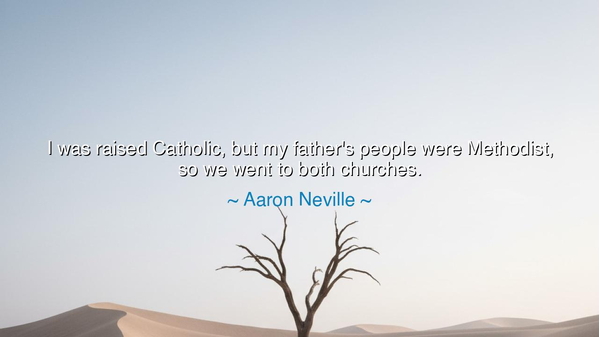
I was raised Catholic, but my father's people were Methodist, so
I was raised Catholic, but my father's people were Methodist, so we went to both churches.






“I was raised Catholic, but my father’s people were Methodist, so we went to both churches,” said Aaron Neville, the soulful singer whose voice carried both pain and grace, and whose faith, like his music, was born from the blending of worlds. In this simple remembrance lies a truth profound and timeless — that faith is not a cage, but a river with many streams; that belief, when nurtured by love and understanding, need not divide but unite. Neville’s words are more than a reflection of upbringing; they are a testament to harmony — the ability to find oneness in difference, to walk between paths without losing the light.
The origin of this quote comes from Neville’s childhood in New Orleans, a city where faith and rhythm are interwoven, where the sacred and the soulful breathe the same air. Born to a devout Catholic mother and a Methodist father, young Aaron found himself moving between altars, hymns, and traditions. But rather than confusion, he found beauty — the beauty of many voices praising one Creator. To attend both churches was to learn that God speaks in many tongues, and that the divine presence cannot be confined to a single sanctuary. His heart, open like the gospel songs he would one day sing, came to understand that faith is not about where you worship, but how you love.
In this, Neville echoes the wisdom of the ancients — that truth is not diminished by diversity, but deepened by it. The Greeks spoke of many gods with one essence, the mystics of every age have whispered of a unity beyond form. So too did Neville, without theology or philosophy, grasp this truth through experience: that the light of faith shines differently through each window, yet remains the same sun. His Catholic rosaries and Methodist hymns were not contradictions, but harmonies in a greater song — the song of the human spirit seeking the divine through whatever melody it knows.
History offers many who walked a similar path of spiritual synthesis. Consider the great Mahatma Gandhi, who drew wisdom from Hinduism, Christianity, Islam, and Buddhism alike. He once said, “Truth is God,” meaning that no faith held a monopoly on the divine, for all were fingers pointing toward the same sky. Like Neville, Gandhi understood that when the heart is open, every prayer, from every faith, becomes a thread in the same divine tapestry. The wise, therefore, do not guard their beliefs with walls, but with reverence — knowing that the sacred is large enough to embrace all who seek it sincerely.
Neville’s dual upbringing also speaks to the inheritance of compassion that arises from understanding many ways of worship. Those who walk between traditions learn empathy — the ability to see holiness in forms unfamiliar to their own. They become bridges, healers of the divisions that so easily wound the world. To be raised among two faiths, as Neville was, is to hear the same truth sung in different keys. It is to realize that while doctrines may differ, the call to kindness, forgiveness, and love is the same refrain echoing across every pulpit, every prayer, every heart.
But his words also remind us that such harmony requires humility. The child who sits in two pews learns early that no single path has all the answers — that faith is not about certainty, but about seeking. Neville’s life, filled with struggle and redemption, mirrored that truth. He found God not only in the cathedral, but in the song, in the streets, in the raw cry of the human soul reaching for grace. His faith was not inherited blindly; it was lived, questioned, and renewed — like a river that keeps its strength by flowing through many lands.
So what lesson can we, the listeners, take from Aaron Neville’s quiet revelation? It is this: honor all paths that lead to goodness. Do not let difference harden your heart, for wisdom is not the possession of one people, one creed, or one church. Seek God wherever truth and compassion dwell — in the Mass and in the hymn, in the silence of prayer and in the music of kindness. Let your spirit, like Neville’s, be wide enough to hold the light from many lamps.
And when you stand at the crossroads of belief, when you see others worship in ways not your own, remember this: the divine is not divided — only our hearts are. The task of the faithful, therefore, is not to choose one light and curse the others, but to keep the flame alive wherever it burns. In doing so, you, too, will walk in the wisdom of Aaron Neville — a soul raised in two churches, yet belonging fully to one eternal truth: that love, above all creeds, is the truest faith of humankind.






AAdministratorAdministrator
Welcome, honored guests. Please leave a comment, we will respond soon